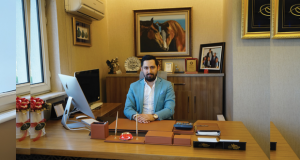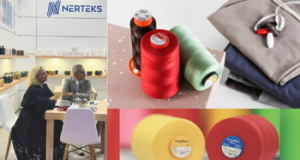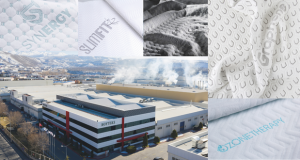Operating as a subsidiary of Hassan Group, Şiteks is the first enterprise of the Group, at the same time.
The Company that has been satisfying the Felt requirements of various sectors on an area of 70,000 square meters in total (30,000 square meters covered and 40,000 square meters open) in Saray, Tekirdag, produces Felts by decomposing the factory and textile wastes in the state-of-the-art machinery in addition to the original raw materials with the understanding of environmentalism. Ahmet Ilhan who has been working in Hassan Group since 1996 and is working now as the Director of Exports of Şiteks, Ahmet Enver Ilhan rendered the current position of the Company and its targets in 2014.
With which products does Şiteks serve the sector?
Hassan Group was established by Hasan Şişman. Now, it continues to the third generation works. Various companies were established in this group and these companies have 20 factories in total.
ŞİTEKS that features that it is the first enterprise and the first producer of the sector continues its operations in Tekirdag. The products of Şiteks that is contributing both to the environment and to the Turkish Economy by transforming the textile wastes into products feature as intermediate products, anti-microbiality, extra flame retardancy, special production with desired thickness and hardness, and making a combination with synthetic jute and nonwoven which are capable of being produced as rolls or as cut parts. Our Company that is producing felt also from natural cotton and wool produces products which feature formability, laminability, matrix cut and moldability in the sector of mattresses and furniture.
Would you mention about other Companies of Hassan Group and the operations performed by those Companies?
Hassan Group that was established in 1939 for the first time and that began the production of Nonwoven showed the success of being the leader in Turkey and being one of few producers of the world in the international platform with the accumulation of 66 years of knowledge and experience. Our Company has reached a distinct point in the sector at the same time with its modern and technological investments, its use of quality raw materials, its wide range of products, its uncompromised quality and its cadre of specialists.
The second oldest Company of the Group, HASSAN Textile Industry and Trade Corporation was established in 1985 and produces primarily needled Felt. It offers the Felt produced by it by needling to the sectors of shoe, artificial leather, automotive, construction, ready-made clothing, health and cleaning clothes after needling processes are applied on it again with a chemical (impregnated or medicated on one side), calendar and thermo-fixed or another surface.
Another Company of the Group HASPAŞ was established in 1989 and one of the first producers of the quilting sector. Continuing its production of stitch-bonded interlining and Rascel knitting with its 14 computerized and mechanical quilting machines, the Company allows to produce daily up to 10,000 meters veil and quilting with a width of up to 3 meters and unlimited pattern with 360 degrees computerized machines and quilting for mattresses and upholstery with fibers, Felt and foam rubber.
Haspaş started to produce products of home textile group like bed-linens, quilts, pillows, coverlet sets, etc. in 2004, as well. Haspaş prepared a new collection with the brand of “Lilamor” in addition to the brand of G&G used by it for its existing products. With that collection, specially designed bed coverings, bed-linens, coverlet sets and headings are presented to the tastes of its customers.
In summary, operating in many sectors, Hassan Group comprises of 8 separate Companies as Haspaş, Teksis, Telasis, Catsis, Axis, Merkas and Pelsan.
You said that Şiteks produces Felt. Well, would you mention about Felt and its importance in the mattress?
There are 3 separate Felts in a mattress. First is the products combined by heat processes and used on the springs directly which we call hard Felt. These lessen the hard effect of the spring and spread it on the surface. They spread the weight of a person given to the mattress and prevent it from being concentrated on a certain point. Our Company can produce hard Felt from 300 grams to 3,000 grams. Now, we have 8 production lines. Our monthly production capacity is 3,500 tons.
Another sort of Felt is filling Felts. These are medium-hard Felts used between top cloth and hard Felt. They can be produced in different grams and with different thicknesses and they may show variation depending on the countries and their mattress cultures.
For the mattress, on the top layer foam rubber or fiber is used so that the quilting seems beautiful. Here, the third type of Felts, Felts for quilting begin to function. These are softer that the others. And they make the quilting seem more beautiful. And these are also produced in different grams and with different thicknesses with the needling technique. In fact, we can classify the Felts for quilting used by us in this area into 3, as well. These are: recycled cotton Felts, original wool Felts and original cotton Felts.
We are producing at the same time a Felt which does not catch fire which we call fire break. Especially in the countries like England and America, non-flammability is preferred very much. Burning of the completed mattress is not desired there. Other than that, non-flammability is desired in hotels, in military, in hospitals and in prisons. And for that purpose, we are producing special non-woven clothes. These products are used right under the completed clothes. Materials like foam rubber or fiber are located thereunder. Thus, non-flammability of the mattresses or non-growth of the fire, in case of a possible fire, is ensured. In a sense, it functions as a barrier. You can ensure that non-flammability in two ways. First, you can produce the fiber with non-flammable chemicals. You use carbon and non-flammable fibers therein. Second, you get a non-woven cloth with a feature of less non-flammability and you may inject a non-flammability liquid onto it. By that way, we produce fire break products.
There are various products in your range of products. How do you procure your raw material requirements for those products? Do you import them?
Generally we make business with domestic companies for the Felts for mattresses. Because textile sector is very strong in Turkey. We collect the textile wastes from the market there. We collect the clothes which will go to the garbage, and we re-open them and we transform them into fiber. Thus, we use recycled products completely. In short, we collect all wastes related to the clothes and threads and we transform them into Felt.
Would you give information about your R&D studies?
Fire break which we have developed due to the demand for the non-flammable mattress in the market is one of our R&D products. In fact, due to the desire of the companies in our country producing completed products, we observed these demands in the fairs in our country and in the foreign countries. By this way, we continue to produce our new products. We improved non-flammability of the Felts, as well.
Another product demanded now is the Felts one side of which is wool and the other side is normal. With this product, the companies desire to reduce the costs more. Considering that in that aspect, this is also a R&D. And one of our customers requested a Felt that covers more area and thus reduces the foam rubber in the mattress. We produced a Felt combined with foam rubber and scrap Felts. Thus, a high Felt was created which seems like foam rubber.
As Director of Exports, would you mention about the countries and the regions to which Şiteks makes exports?
As Şiteks, we make regular exports to approximately 40 countries. At the same time, exports constitute 25 % of our production. We make exports generally to European, Middle East, Russian and Eastern Bloc Countries and to North Africa, and recently to Southern Asian and Latin Countries. When we target to grow away from the fragilities in the domestic market, exports are our vital instrument. The Countries in South Africa and in North America are the countries to which we do not make much export. We desire to make exports to these regions, as well. We have contacts with certain companies in Asia. We target to improve ourselves by making exports to these countries.
Do you participate in the fairs as a Company targeting to increase its exports?
We have been participating in every Interzum China, Russia and Germany since 1997. As a matter of fact, we are among the oldest companies participating that fair. Other than that, we have been participating in local fairs made in the countries like France, England, China, Saudi Arabia, Algeria and Dubai, etc. However, it is a reality that main fairs are successful and their returns are stronger. We think that visiting companies is more successful than participating in local fairs. There are approximately 10 Felt producers in Turkey like us. They agree with us.
When we make an evaluation of 2013, how was this year for your Company?
I can say confidently that we were more comfortable this year compared to 2012. However, there were regular sales and production in the old days. In some degree, we knew how much we would sell in each month. In 2013, however, we sold too few in a month and too much in another. In the first quarter, the works almost stopped. And in the last quarter, we have not been able to supply enough products. That shows that people gave up the idea of buying more products regularly and building an inventory, and that they headed towards spot markets. Due to the crises in Europe and in the Middle East, the companies cannot forecast the future precisely and they behave carefully. However, as a company, we closed 2013 over 2012.
What are the plans and the targets of your company for 2014?
We purchased a new line and we started to operate that line. We increased our capacity and we think to fill that increased capacity with exports. We think that that increase will be at least around 25 %. We visit many new companies and we submit new bids. We plan to make sales to the existing customers with more different systems. No one has any pessimism for the time ahead of us. We think that 2014 will be a better year, as well. Our purpose is that we can take place in various sectors, and we continue our works to that end.
What do you want to add finally?
I think that the deficiency in Turkey is that there is not any union in our sector. I think that a union should be established now. By this way, we can establish a better dialog. Considering Europe, even our competitors ask why we sell a product with a lower price when we can sell that with a higher price. Maybe, we can make our voice to be heard together with these publications and we can come together. We should produce quality products rather than cheap products. By this way, both we and Turkey gain much.
 SleepTech Magazine Mattress, Accessories, Machinery, Raw Materials
SleepTech Magazine Mattress, Accessories, Machinery, Raw Materials


